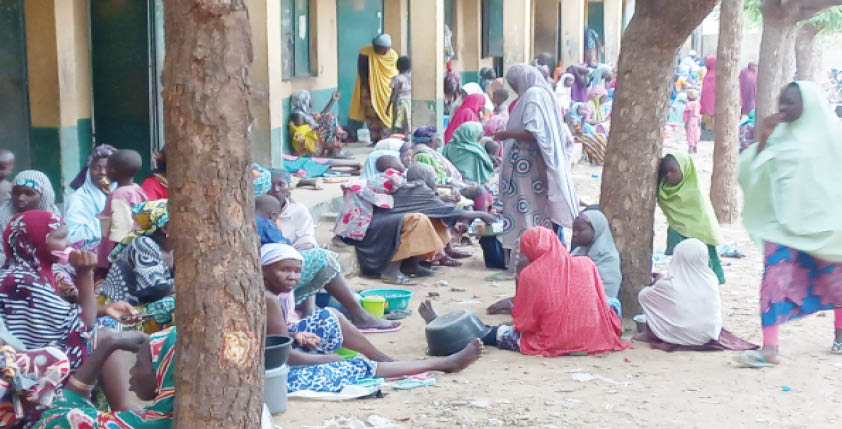Ramadan: Plights of residents displaced in Katsina
People, especially of limited means of livelihood, do save whatever they could ahead of Ramadan, because it is a month that comes with a lot of adjustments, including in patterns of worship and lifestyle. People have some adjustments in the kind of food they eat and the cloths they plan to wear, particularly for children […]

Some displaced residents in Katsina
People, especially of limited means of livelihood, do save whatever they could ahead of Ramadan, because it is a month that comes with a lot of adjustments, including in patterns of worship and lifestyle.
People have some adjustments in the kind of food they eat and the cloths they plan to wear, particularly for children on Sallah Day, and a few more days thereafter. They all have to plan for it except where absolutely impossible, just as in the situation some communities in Katsina have found themselves in.
Recently, a whole community, a town called Shimfida in Jibia Local Government Area of Katsina State and some nearby communities were displaces by bandits following the abrupt withdrawal of the military camp that hitherto provided security to the area.
Thousands of men, women and children were displaced and they were scattered to different locations, with children in some cases been separated from their families.
At least 2,500 of such IDPs are currently taking refuge at a primary school in Jibia and that is where they have to observe their Ramadan fast in a very unfavourable condition, a condition only better than being in the hands of bandits as captives.
A first glance at the camp is enough for one to understand that those people are far from comfort.
Some large pots and big rubber containers, similar to those of the correctional centres, are being used to cook their food and prepare their pap, the quantity of which, without being told, one would know defy any good taste.
Sa’ad Salisu Shimfida, the chairman of Shimfida Youth Development Association who doubles as Chairman of the IDPs in the Jibia camp, narrates the living condition in the camp under which they have to endure.
“It is a condition of hardship and melancholy. As you know, anyone that was happily living within his family, community and within his means of livelihood, only to be dislodged and jam-packed in such a manner as we are here, cannot be expected to be happy. We are only grateful to God that if we were not here today, the story would have been different,” he said.
On the way Ramadan fasting is being observed on the camp, Salisu said, “It is indeed not easy at all, but we thank God, we are getting a lot of assistance in terms of food and drinks from the government, organizations and individuals here in Jibia town. But that does not mean we are having enough, considering the number of people here.”
He said they receive food aid from the government, through the State Emergency Management Agency (SEMA) which include rice, beans, corn and maize, and from other organizations, they received rice, beans and spaghetti.
He explained that due to the high number of the IDPs in the camp, they could only cook the rice, sometimes with beans or spaghetti, which they eat at night and in the early morning (Sahur). But as for the food for breaking the fast, a time where people who are chanced will use a variety of delicacies, the IDPs in Jibia only use pap made from the corn, except some few ones that could go into the town to get some other things such as ‘akara’.
“We use to cook once every day. We prepare pap for our breakfast then cook rice or tuwo which we eat at night and if you want to get something for your sahur, you have to keep some of it for that,” he said.
He explained that some individuals from Jibia town do assist with some locally prepared zobo juice, sachet water and pap also to support them.
Salisu said there is still lack of ingredients such as seasoning, salt, oil and other soup ingredients, which makes the food tasteless.
Similarly, Malama Murja Abdulwahab, said “We were living in peace and affluence in our own right, but unfortunately this tribulation came our way.
“My husband has three wives and here we are all in the same part of a classroom. We sleep with our 11 children here while our husband sleeps outside. That alone is a distress on its own.”
She said though they are getting food support from different people and they are grateful for it, it was far from enough in terms of quality and quantity.
While Salisu has called on government to upscale their assistance to the IDPs, especially as regards food ingredients and other provisions such as sugar, soap and detergent, Malama Murja urged government to do whatever is possible to ensure the return of the military to Shimfida camp so that they will be able to return home where they are more comfortable.
